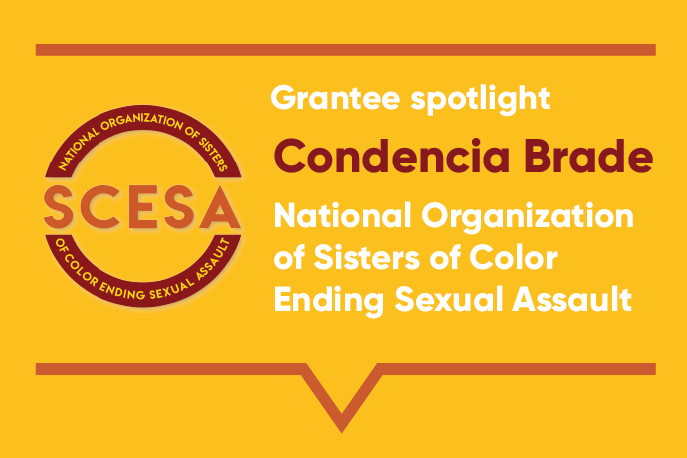RALIANCE officially launched the application process for its 2021 grant program last week, part of our long tradition of supporting critical work to end sexual violence in partnership with the National Football League. To highlight the great work being done by past RALIANCE grantees, we’ll be sharing stories directly from the leaders of organizations supported by our grants.
This week, we sat down with Condencia Brade from the National Organization of Sisters of Color Ending Sexual Assault (SCESA). In our conversation, Condencia discussed the nonprofit’s mission and how RALIANCE’s grant enabled them to strengthen their work on safe housing for survivors of color.
RALIANCE: SCESA’s focus is on advocating for and supporting survivors of color. Why is it so important to provide women of color with support that meets their specific needs?
Condencia: We know that women of color face sexual violence at higher rates than women in general, not because communities of color are more violent, but because of the historical, systemic, and ongoing violence that is inflicted upon our communities. This violence devalues women of color – in society, the media, as well as in our communities and homes. We also know that there is a great degree of silence among women of color – they are unlikely to report sexual violence, so we know that the problem is actually even worse than it appears.
This disparity makes it clear that women of color need culturally relevant resources and support that goes beyond cultural competency training, which is why SCESA is grounded in the voices and experiences of our communities. We take the time to listen to our communities to enhance our understanding of their needs. We consider it our role to lift up their voices in conversations about the responses and policies sexual violence survivors need.
RALIANCE: What type of support is most helpful for survivors of color?
Condencia: Women of color have needs that are as diverse as our communities, whether Black, Brown, Indigenous, Pacific Islander. But broadly speaking, women of color need support that can help rebuild their core after surviving trauma. Trauma often destroys a person’s core, and rebuilding for some survivors means reconnecting to a cultural community. For example, a culturally relevant program would address sexual violence through the history, meaning, and creation of cultural art and dance.
RALIANCE: SCESA received a grant of $50,000 from us to lead a national project on safe housing and culturally specific healing spaces for survivors of color. What was the impact of that project?
Condencia: We are so thankful for the grant from RALIANCE, because we’ve been working hard to learn more about gaps in safe housing. The funding enabled us to engage in direct conversations with women of color about their needs. We continue to work on a final report of our findings and recommendations, but I can already say that we’ve gained a lot of insight.
For example, while many members of our community need safe housing, we learned that there are few people of color in the leadership positions and key policy roles to make decisions that prioritize our community. In addition, we’ve learned that there is a need for more organizations specifically built for communities of color. These organizations can provide the holistic and cultural support many survivors of color need to ultimately secure and maintain permanent housing.
Most often, we hear from survivors of color that they just need a space to breathe and figure out their next steps. It’s about giving them the room to make decisions for themselves. Some programs are overly focused on moving survivors immediately to housing, rather than giving them the space to understand their trauma.
RALIANCE: How has the pandemic impacted safe housing for survivors of color?
Condencia: The pandemic has negatively impacted safe housing in a couple ways. First, the economic impact of the recession has left many women of color with less income, making it harder to pay rent and maintain stable housing – so the need for safe housing support is greater than ever.
Second, many survivors may reside with their abusers, and in some cases the pandemic has forced them to quarantine in the same place as the person who has caused harm. Because there is so much silence in our community regarding sexual violence, the other people survivors live with might not even be aware that a survivor has faced abuse within a shared home. This poses a major challenge to finding a safe, healing space.
RALIANCE: How can our readers support your organization?
Condencia: We are a small organization determined to make a difference in the lives of sexual violence survivors – and we can’t do that without funding. Unrestricted donations from individual donors provide us with the flexibility to meet the culturally specific needs of survivors of color without limitations. We’re grateful for all support!
The National Organization of Sisters of Color Ending Sexual Assault (SCESA) is a nationally recognized nonprofit organization. To support SCESA’s mission, you can donate online here.
RALIANCE provides consulting, assessment, and employee development services to help build more equitable workplace cultures and create environments free from sexual harassment, misconduct and abuse. We stand ready to support your organization’s goals – contact us today at info@raliance.org to get started.

